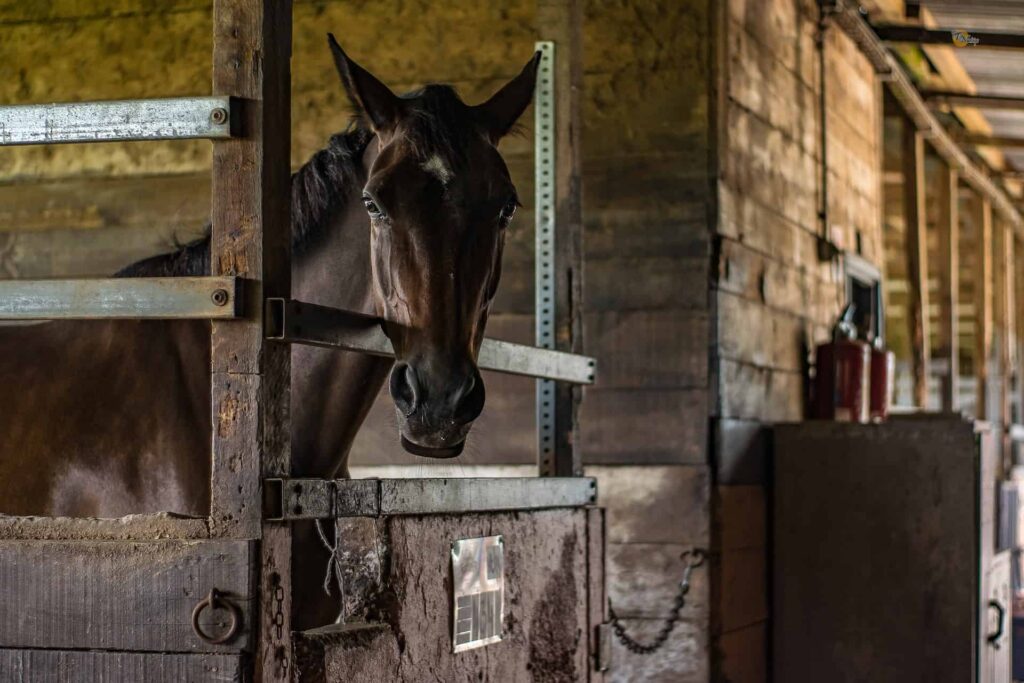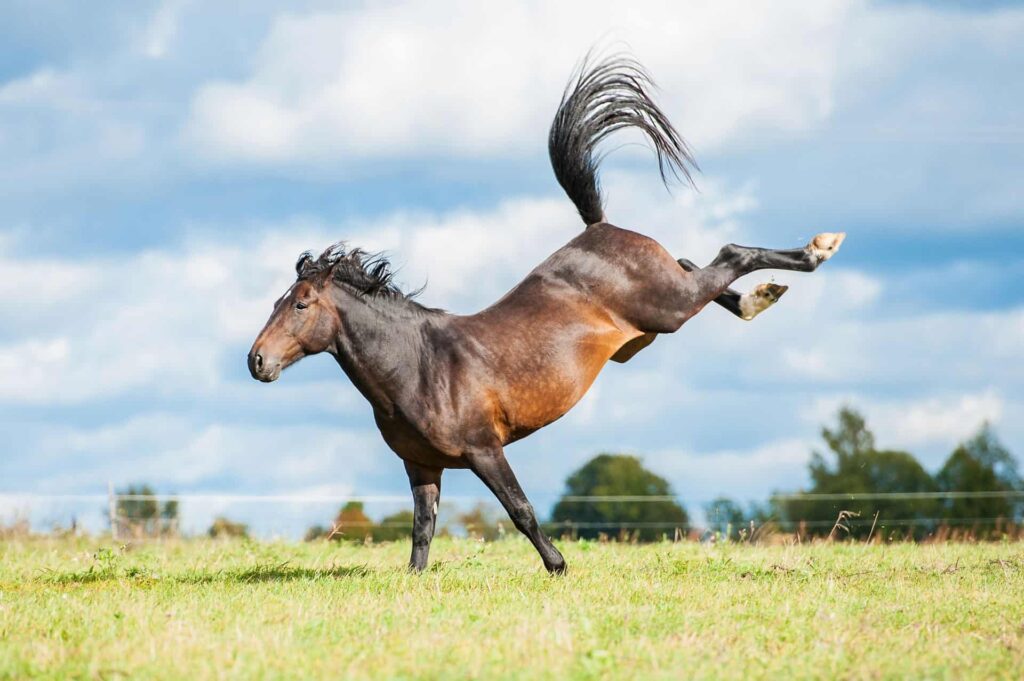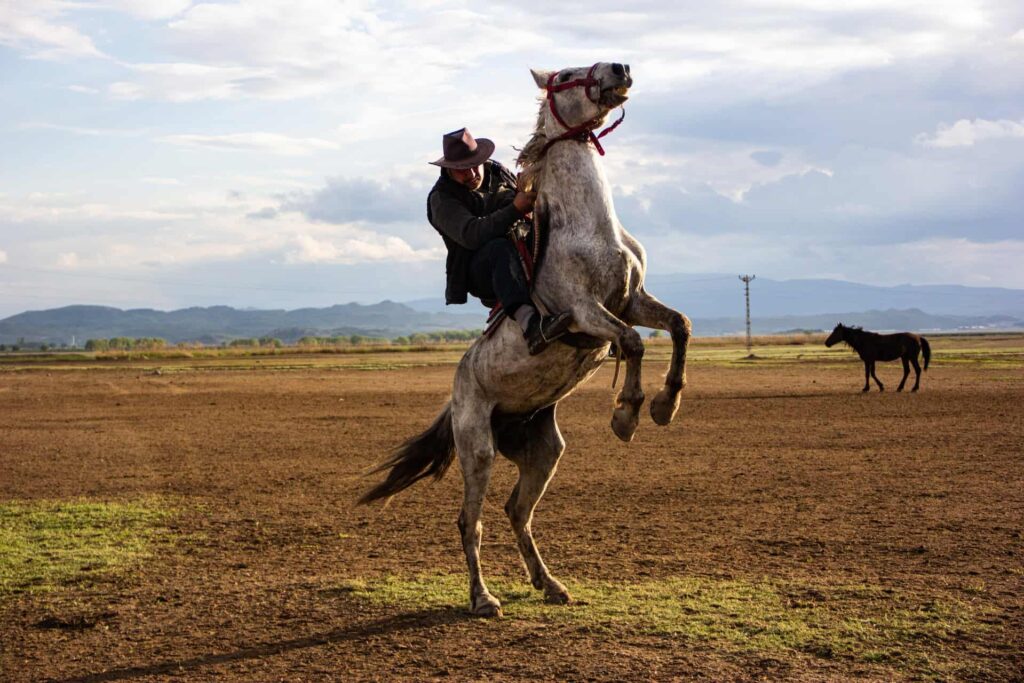Horses exhibit a range of natural behaviors, and a horse chewing wood is one that often puzzles and concerns horse owners. This behavior, technically known as lignophagy, involves horses gnawing or biting on wooden structures such as fences, stalls, and trees. While it might seem like a harmless quirk, wood chewing can have several underlying causes and potential implications for the welfare of the horse. It’s important to discern why a particular horse is engaging in this behavior to ensure proper care and management.
Understanding the reasons behind wood chewing is essential for horse owners. Factors contributing to this behavior may include dietary deficiencies, particularly a lack of sufficient fiber, boredom, stress, or the development of stereotypic behavior due to confinement. While some horses may chew wood occasionally without serious repercussions, persistent wood chewing can lead to dental wear and even gastrointestinal issues if wood splinters are ingested. It’s, therefore, critical to explore the most effective prevention strategies and identify when professional advice is needed to address the problem.
Key Takeaways
- Wood chewing in horses can signal nutritional gaps or behavioral issues.
- Appropriate management and environmental enrichment help mitigate wood chewing.
- Consulting a veterinarian or equine nutritional expert is advised for persistent cases.
Understanding Wood Chewing Behavior
Wood chewing in horses is a multifaceted behavior that can have various underlying causes and significant health implications. This section will explore the complex reasons behind this habit, its effects on equine health, and the measures that can be taken to address it.
Defining Wood Chewing and Cribbing
Wood Chewing: This is when horses gnaw on wood surfaces like fences, stalls, or trees. It is a distinct action from cribbing, which involves a horse grabbing a surface with its teeth, arching the neck, and sucking in air.
Cribbing: Classified as a stereotypic behavior, cribbing is often considered a vice in horses. It involves a horse biting on a hard object, pulling against it, and swallowing air.
Causes of Wood Chewing
Various factors contribute to wood chewing, ranging from dietary needs to psychological factors. Nutritional deficiencies, particularly a lack of fibrous materials like hay or grass, can lead horses to seek alternative sources to satisfy their chewing instinct.
Differentiating Between Chewing and Cribbing
While both involve interaction with wood, chewing is typically a response to dietary or environmental factors, and cribbing is regarded as a more compulsive behavior, potentially tied to the release of endorphins.
Psychological and Behavioral Factors
Boredom, frustration, and lack of activities can lead to wood chewing as horses seek mental stimulation. Chronic stress is also a significant factor contributing to the development of this habit.
Health Implications of Wood Chewing
Horses that chew wood can suffer from:
- Teeth damage: Worn or broken teeth from constant chewing.
- Digestive issues: The ingestion of splinters can lead to colic or puncture in the digestive tract.
Environmental and Dietary Influences
A horse’s environment and diet play critical roles in wood-chewing behavior. Limited turnout, lack of grazing opportunities, or insufficient roughage in the diet can increase the likelihood of horses developing this habit.
The Role of Socialization and Activities
Social interactions and environmental enrichment with toys or other stimuli can reduce wood chewing. Horses are social animals and need interaction either with humans or other horses to remain mentally stimulated.
Assessing the Horse’s Environment
A thorough analysis of the stall, paddock, and barn for potential stressors or boredom triggers is essential. Providing a more natural environment with more time spent in turnout can decrease wood chewing behavior.
Importance of Dental Care
Regular dental checks are vital to ensure that a horse’s teeth are healthy and not contributing to the wood chewing habit. The vet should address any dental issues that could lead to or exacerbate wood chewing.
By understanding wood chewing behavior in horses and addressing the underlying causes, owners and caretakers can take proactive steps to mitigate this habit and safeguard equine health.
Practical Management and Prevention Strategies
Managing wood chewing in horses involves a multifaceted approach, focusing on adjusting dietary elements, enriching the living environment, and adopting various deterrents. These strategies can help reduce the occurrence of wood chewing, contributing to better equine health and welfare.
Dietary Adjustments and Nutritional Balancing
A balanced diet plays a crucial role in deterring horses from chewing on wood. Increasing the fiber content in their diet by offering more hay or long-stem forage can engage a horse’s natural grazing behavior, keeping them occupied and aiding in digestion. In cases of nutritional deficiencies, consulting an equate nutritionist and introducing necessary vitamins and supplements like additional grain or roughage can help address the issue.
Improving Living Conditions
The horse’s living conditions directly impact its propensity to develop vices like wood chewing. Maximizing turnout time in a paddock can allow for ample grazing, leading to a lifestyle that better mimics a horse’s natural environment. Well-designed stabling can also prevent boredom and frustration.
Stress Reduction Techniques
Reducing stress levels is key to preventing wood chewing. Regular exercise, grooming, and socializing can significantly decrease stress. It’s important to regularly assess the horse’s mental well-being and introduce changes as needed to keep their stress at a minimum.
Physical Barriers and Deterrents
Protective materials on surfaces such as fence posts, stall doors, and fence rails can act as a barrier to wood chewing. Metal caps, plastic mesh, and chicken wire are effective physical deterrents. Additionally, electric fences can safely discourage horses from gnawing on wood structures.
Utilizing Behavioral and Environmental Enrichment
Environmental enrichment plays a vital role in wood chewing prevention. Providing horse-safe toys and tools like hay nets and slow feeders can redirect the urge to chew toward more appropriate activities. These tools aid in prolonging feeding times and stimulating mental engagement.
Alternative Feeding Methods and Tools
Using alternative feeding methods such as slow feeders, hay nets, and grazing muzzles can mimic natural grazing patterns and extend feeding durations. This not only caters to the horse’s psychological needs but also helps prevent digestive problems like gastric ulcers that may develop due to irregular eating habits.
Veterinary Interventions and Professional Advice
Consistent consultation with a vet or an equine nutritionist is critical. These professionals can provide tailored advice based on interviews and evaluations, addressing specific health concerns such as ulcers or digestive system issues and offering strategies for individualized management practices.
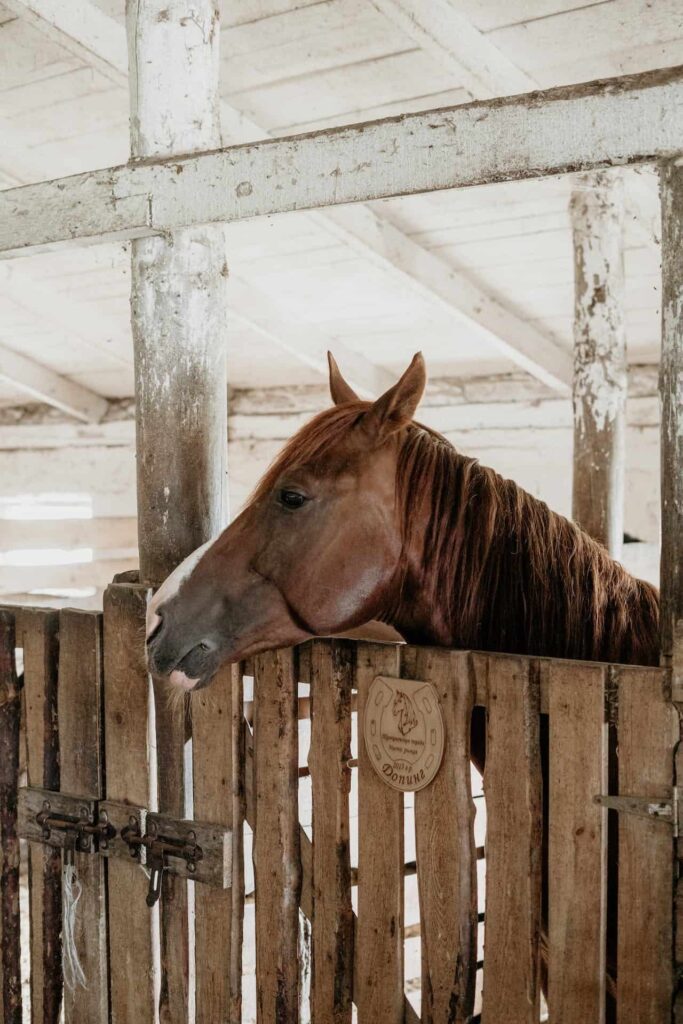
Effective Solutions and Products
Addressing the issue of horses chewing on wood requires a multifaceted approach, utilizing both preventive measures and products specifically designed to deter this behavior. Below, we’ll explore commercial solutions, homemade remedies, and various tactics that can help preserve your fences and stables, while also considering the well-being of your horses.
Commercial Chewing Deterrents
Commercially available chewing deterrents such as pastes, sprays, and gels can be applied directly to fence rails, stall doors, and other wooden surfaces. Products like Cribbox contain a bitter taste that discourages horses from chewing. It is important to select deterrents that are non-toxic and specifically formulated for equine safety.
Homemade and Natural Remedies
For those preferring a DIY approach, homemade remedies with substances such as capsicum (hot pepper) can act as a natural deterrent. However, one must ensure these remedies are safe for horses and do not cause irritation or harm.
Safety Measures for Fences and Stables
To minimize chewing, fences, and stables should be outfitted with physical barriers. Metal caps can be placed on fence posts and railings, while chew guards made from non-toxic metal panels can shield wood surfaces. Additionally, electric fence wire may be installed to safely discourage horses from getting too close.
Equine Toys and Diversion Tactics
Providing horses with ample exercise and turnout time can reduce boredom, a common cause of wood chewing. Horse-safe toys and stable accessories, such as hay nets, can keep horses occupied and divert their attention away from chewing.
Stable Accessories and Protective Gear
To further protect your stable, consider installing plastic mesh or chicken wire over wood surfaces. Such accessories can physically prevent horses from biting wood without causing discomfort or restricting their movement.
Selecting Durable Materials for Stables and Fences
When constructing or retrofitting stables and fences, choosing durable materials such as metal panels or specially treated wood can offer a long-term solution to wood chewing. These materials can resist wear and provide resilience against equine behavior patterns.
When to Consult an Expert
While wood chewing is a common behavior among horses, certain conditions necessitate the expertise of professionals. Owners should observe their horses for signs that go beyond typical habits, as these may indicate underlying health or nutritional issues that require expert intervention.
Recognizing When Behavior is Abnormal
Normal Behavior: Horses occasionally gnaw on wood due to boredom or habit.
Abnormal Behavior: Excessive wood chewing might suggest stress or nutritional deficits. If a horse persistently chews on wood, owners should consider it a sign to consult a vet or an equine nutritionist. Such behavior might also be a sign of vices due to confinement or lack of forage.
Nutritional Advice from Equine Nutritionists
Nutritional Deficiencies: A diet lacking in essential fiber can drive horses to seek alternative sources, such as wood. Equine nutritionists can provide tailored nutritional advice, including the need for supplements, that addresses specific dietary requirements to discourage this behavior.
Exploring Veterinary Care for Physical Issues
Dental Health: A horse’s teeth may cause it to chew on wood if there are alignment issues or discomfort. Gastric ulcers or other equine health problems can also manifest as wood chewing. Consulting a vet for a comprehensive health evaluation is prudent to rule out or treat any physical issues.
Benefits of Professional Behavioral Consultations
Behavioral Expertise: If the issue isn’t resolved through nutritional or veterinary care, seeking a professional behavioral consultation can help. Experts in equine behavior can provide insight into management practices that reduce stress levels and deter unwanted behaviors like wood chewing.
Long-Term Horse Care Practices
When it comes to mitigating behaviors such as wood-chewing, long-term horse care is fundamental. This involves regular health check-ups, a consistent exercise regimen, maintaining an enriched living environment, and diligent dietary management to promote overall equine health.
Routine Check-Ups and Dental Care
Regular veterinary check-ups are essential to prevent and identify health concerns early. Dental care deserves special attention as it directly affects the horse’s ability to process and absorb nutrients from its diet. Providing routine dental examinations ensures that any dental issues, which can contribute to wood-chewing, are addressed promptly.
Regular Exercise and Social Activities
Horses are inherently social and active animals, requiring regular exercise and social interaction to maintain their physical and psychological well-being. A consistent exercise routine, along with sufficient turnout in a safe paddock, helps in managing stress and curbing the development of stereotypic behaviors such as wood chewing.
Maintaining a Safe and Enriched Environment
The barn and paddock should be maintained to prevent injuries with secure fencing to eliminate risks of escape or harm. Toys and foraging devices act as environmental enrichments that reduce boredom and discourage destructive behaviors. They are significant for horses that spend extended periods in confinement.
Consistent Dietary Monitoring and Management
A horse’s diet must be closely monitored to prevent nutritional deficiencies. Hay and grain should be supplied in appropriate amounts, supplemented by essential vitamins and supplements as necessary. This maintains overall equine health and helps mitigate undesirable habits related to insufficient or imbalanced nutrition.
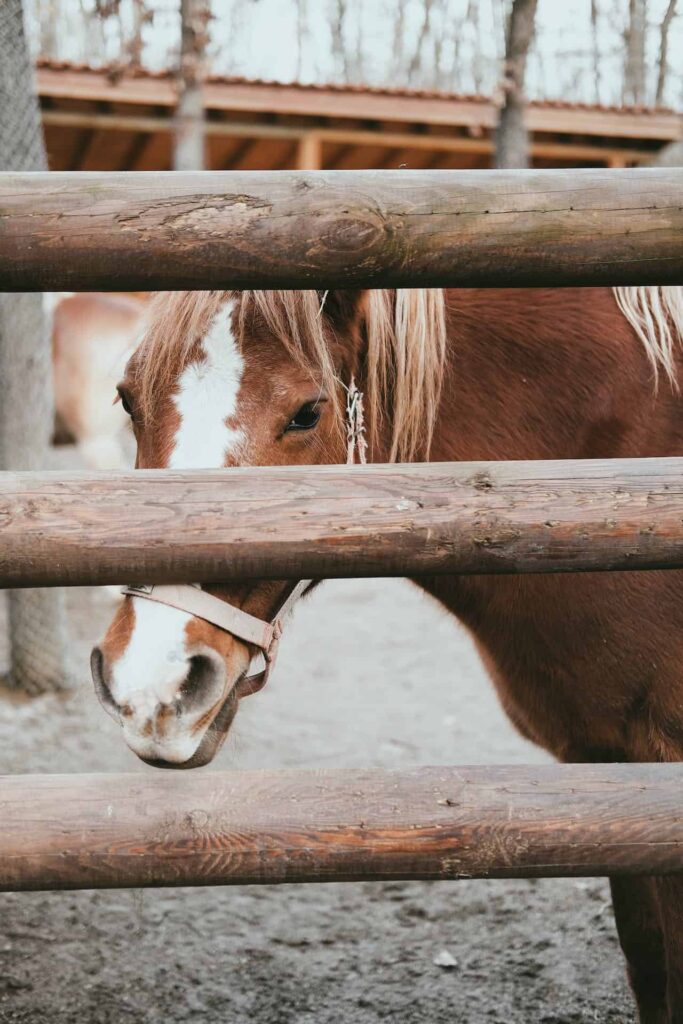
Why Do Horses Chew on Wood – Final Thoughts
In addressing wood chewing in horses, it is recognized that a spectrum of factors contributes to this behavior. A primary consideration is that horses may chew wood out of boredom. Limited interaction with their environment and lack of stimulation typically found in stabling conditions are contributing factors.
Diet also plays a crucial role. A lack of sufficient roughage can prompt horses to seek alternative sources, leading to behaviors such as wood chewing. This is not merely a behavioral issue but also a nutritional one, as appropriate forage can help reduce the incidence of wood chewing.
Stress is another significant component. Horses experiencing anxiety or discomfort may turn to wood chewing as a coping mechanism. Such an activity can eventually evolve into a habit, persisting even when the original stressors are removed.
Effective management practices are therefore vital. They should aim to replicate a horse’s natural environment and behaviors as closely as possible. This includes providing adequate socialization opportunities, proper forage, and enrichment activities to mitigate stress and alleviate boredom.
Changing these practices is not a guarantee against wood chewing but is often a successful strategy in reducing the behavior. Through careful and attentive management, the well-being of horses can be upheld, lessening the prevalence of wood chewing and other related issues.
Frequently Asked Questions
Here are some common inquiries about the behavior of horses chewing on wood, providing insight into prevention, dietary connections, commercial deterrents, and alternative strategies.
What can be done to prevent horses from chewing on wooden structures?
Owners may prevent horses from chewing on wooden structures by ensuring proper feeding routines that include sufficient forage to promote chewing activity and reduce boredom. Environmental enrichment and regular exercise also play a crucial role in preventing this behavior.
Are there any specific dietary deficiencies that lead to horses eating wood?
Horses may chew wood when they experience deficiencies in certain minerals or fiber. Providing a balanced diet with adequate roughage can often mitigate the need to chew wood.
What are the most effective commercial products to deter horses from wood-chewing?
Commercial products like bitter-tasting sprays and physical barriers are designed to deter horses from wood-chewing. These products make wood surfaces unappealing or inaccessible to horses.
Is wood-chewing a behavior that can be discouraged with homemade remedies?
Homemade remedies such as applying substances with a bitter taste, like vinegar or chili powder, to wooden surfaces might reduce wood-chewing. However, these solutions may not be as effective or long-lasting as commercial deterrents.
How does providing a horse chew toy help in reducing wood-chewing behavior?
A horse chew toy can serve as an appropriate outlet for a horse’s natural chewing instincts, which can help redirect the horse’s attention away from wood and reduce the occurrence of wood-chewing behavior.
What term is used to describe the act of a horse habitually chewing on wood?
The act of a horse habitually chewing on wood is referred to as “cribbing” or “wood-chewing”. This behavior is considered a stereotypy, which is a repetitive and seemingly purposeless activity often seen in domesticated animals.
Last Updated on December 7, 2023 by Nate Dewsbury
